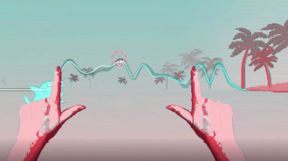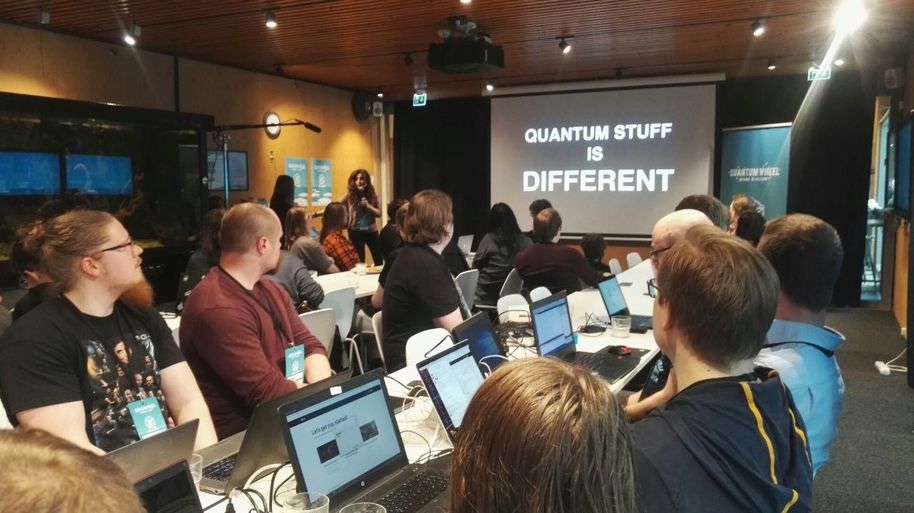Crazy ideas and hamsters

Hackathons, where people from different fields gather together to solve problems, are familiar events in the world of technology. Fierce competition between the teams is at the core of these events.
The quantum game jam is similar to a hackathon, but instead of competition, it focuses on “creative jamming,” says the organizer of the upcoming Quantum Game Jam and Doctoral Candidate Laura Piispanen.
“The word jamming refers to joint, improvised playing, especially in jazz and blues,” Piispanen states.
The idea is simple: during the weekend, teams design a game in some way related to quantum mechanics. At the start of the day, the theme is announced to guide the game development process. Teams consist of experts in different fields and include coders, physicists, musicians and artists, for example.
Anyone with the least bit of interest in game development or quantum physics can participate. Because the jammers are provided with basic information on quantum games, a background in physics is not needed.
The event is arranged by Aalto University, the University of Turku and International Game Developers Association (IGDA Finland).
Quantum physics brought to real life
The Quantum Game Jam event was first arranged in Turku in 2014. Laura Piispanen was doing research on physics at the University of Turku when a group of colleagues became interested in arranging a quantum game jam and she got involved.
Although Piispanen had coded during her physics research, the jam provided her with her first encounter with game development.
Piispanen got excited about quantum games and got an opportunity to do a doctoral thesis on the subject at Aalto University. The thesis is shared between the Department of Computer Science and the Department of Applied Physics.
Laura PiispanenGames provide just anyone with the possibility of getting to know phenomena of quantum physics.
Quantum games are games that somehow involve phenomena of quantum physics. Connections can be thematic or numerical, Piispanen explains. The jams also provide an opportunity to utilise an actual IBM quantum computer.
Piispanen is fascinated by the opportunities games and interactive art can bring to the study of quantum physics. She would also like to change the reputation of quantum physics as a mystical science that cannot be grasped.
“Games provide just anyone with the possibility of getting to know phenomena of quantum physics. It is, however, a world we have no connection to in our everyday lives,” Piispanen describes.

New life to game development
In recent years, quantum technology and quantum computing have been studied hard, which has also increased the popularity of Quantum Game Jams.
Quantum games benefit both physicists and software developers.
Connecting quantum computing to games can bring new possibilities to both developers and games itself. Physicists, on the other hand, have used quantum games, for example, to develop quantum algorithms.
Previous Quantum Game Jam events have resulted in a range of games, music and interactive artworks – some of which have been developed further.
Piispanen recalls that one year a quantum computer simulated music and a musician “jammed” along by playing a clarinet and singing quantum-jazz. One game was played by scraping away at the DJ mixer and another was reflected on a planetarium.
Piispanen’s team came up with a crazy idea a couple of years ago: let’s develop a game where you must save a hamster from quantum waves to dry land! The game called Hamsterwave was later developed further, and it ended up on a showcase at Oodi library. This illustrates the idea of the quantum game jams well, Piispanen points out.
“They give people the freedom to try out something crazy and the possibility to create entirely unique ideas.”
The Quantum Game Jam event is arranged during 1–3 October on a dedicated Discord-server. More information and how to sign up here.
Read more news
Soil Laboratory Exhibition – Exploring the Dialogue Between Human and the Earth in Utsjoki
Soil Laboratory explores the relationship between humans and the earth as a living landscape through ceramic practices in Utsjoki.
The Finnish Cultural Foundation awarded grants for science and art
A total of 15 individuals or groups from Aalto University received grants
Environmental Structure of the Year 2025 Award goes to Kalasatama-Pasila tramway
The award is given in recognition of meritorious design and implementation of the built environment. Experts from Aalto University developed sustainability solutions for the project.






